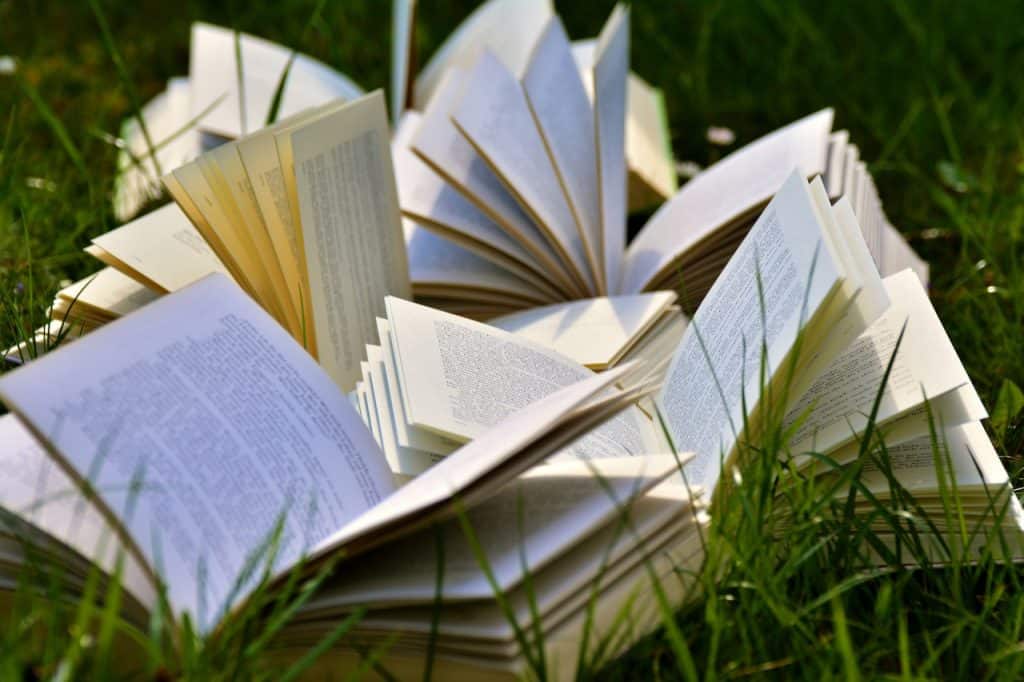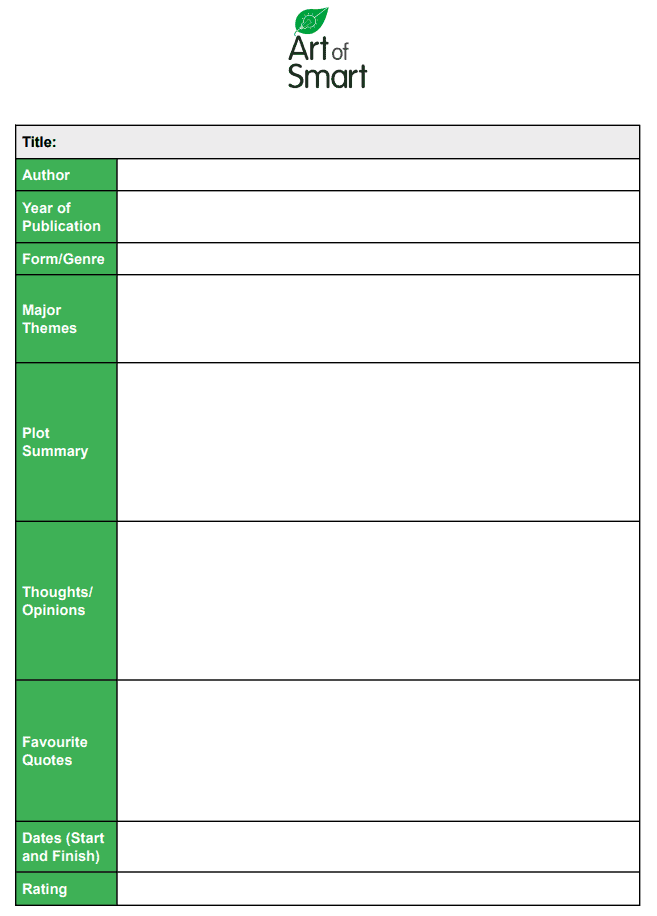If you are curious about starting a reading journal or how to optimise one, you have come to the right place!
In this article, we’ll explore what a reading journal is, how to set one up and the benefits of keeping one, especially throughout your schooling and developing core English skills.
Without further ado, let’s get started!
What is a reading journal?
What do you write in a reading journal?
Picking What to Read
What are the benefits of a reading journal?
Template for a Reading Journal
Studying Texts in Senior High
What is a reading journal?
A reading journal can help you to build a reading habit and help you to understand what types of books you enjoy or find interesting! As time goes on, your reading journal will also help you to remember what books you read and when you read them, or even show you how your tastes develop and change over time.
A reading journal is a place for you to track anything that is book-related, from what you read, who wrote the book, when it was published, your thoughts and opinions, or favourite quotes. This means that it can be a tool in helping you to develop critical thinking skills and comprehension — which we will go into later in the article!
To set up a reading journal, you can use printables, embed them into your bullet journal or planner or even buy a dedicated book journal for it. They can even be digital!
The most important thing is that your reading journal suits your reading habits and goals.
What do you write in a reading journal?
What you include in a reading journal and how you set one up is going to depend on you and your goals! These are just our general ideas for essential aspects to include when writing about a text you’ve read:
- Title
- Author
- Year of publication
- Form or genre
- Major themes
- Characters
- Summary of the plot
- Thoughts about the text
- Favourite quotes from the text
- Date you started reading, and the date you finished
- Rating for the text
Feel free to pick and choose what kind of information you would like to include and omit those you don’t!
Picking What to Read
Another key aspect to keeping a reading journal is finding something to read. While most people keep reading journals for the books they read, you don’t have to be limited to this!
Short stories, op-eds, poems and news articles can also be included in your reading journal as well. In fact, keeping a reading journal that logs the form of the pieces you read can help you to read more widely and explore forms that you may not usually read.
A way to decide what to read is to think about what you are interested in and the genres you feel like reading. Alternatively, if there is an author that you enjoyed reading, you can also check out if they have written other books.
If you are really stuck on what to read, ask your friends, teachers or school librarians for recommendations and they will be sure to point you in the right direction!
Once you have picked a text to read, you can also be on the lookout for what else may interest you. To avoid losing track of them, you can have a page dedicated to books you want to read in your reading journal so you never have to worry about what to read next.
What are the benefits of a reading journal?
A reading journal helps you with comprehension and textual analysis, especially if you’re already in high school. Keeping a reading journal helps you to notice details in texts that you may otherwise miss, helps you to unpack a text, considering how they are composed and encourages you to reflect critically on the text.
#1: Understanding Context
By writing down details such as the ethnicity of the author or the date it was published, it also makes you aware of the broader historical and cultural context of the text. This can help with reading comprehension by encouraging you to consider why the author chose to write about these particular themes at this particular time, and why you still study this text today!
Although it may not be something that you write about in your reading journal, the awareness of the details and the consideration (however brief) is still beneficial to developing your analytical skills.
#2: Articulating Your Thoughts
Since reading journals are informal and not meant to be read by others (except maybe for future you!), they are a great way for you to consider how you feel about a text and a way for you to practise articulating your opinions into words.
What you write in a reading journal about your set text may not go straight into your essay, but it can help you develop a thesis or develop the Elaboration of your TEE structure.
#3: Improving Your Own Writing
Not only do reading journals help you with your essays and critical writing you have to do in high school, but they can also help you with your creative writing as well!
Keeping a reading journal can help you to read more widely, this exposes you to different types of texts and authors. By reading a range of different texts and writers, you get to observe how purpose and narrative are crafted in writing!
You’ll also have a greater understanding of various topics and will probably find it easier to come up with ideas when you start writing a piece.
Brush up on the essentials of writing an extended response and check out our complete guide here!
Template for a Reading Journal
Download our reading journal template below and customise it to your liking!
Studying Texts in Senior High
In Year 11-12, you will study a range of different texts that have different literary features, forms, audiences and motivations. Additionally, you will be required to engage in a range of writing activities from essays, creative writing, viewing and listening tasks, multi-modal presentations and reflective tasks to name a few.
Analysing Texts
Keeping a reading journal helps to make you more aware of what kind of forms and ideas you engage with. When you study prose, poetry, plays, films, fiction, non-fiction and digital media texts in school, you’ll have to interpret and analyse the texts.
While the techniques and evidence that you use will differ based on the form of the text, the core skills of interpreting and analysing remain. A reading journal encourages you to think more deeply about a text, encouraging you to articulate and write down your thoughts.
It is a fun and informal process, without all the stress and expectations that may traditionally come with working on an essay or STEEL paragraph for school!
Critical Thinking
Not only does a reading journal help you with developing your interpretation and analytical skills in a fun way, but it also helps you to develop your own critical thinking skills as well!
By writing about the texts you already enjoy in your reading journal, you are able to figure out what interests you about a particular author and the book, what aspects you liked, did not like and why. This is invaluable for your writing tasks as you will be able to articulate your thoughts in reflective assignments and will likely lead to unique observations about a text that you can write about.
Understanding How Creative Pieces are Formed
Furthermore, having an awareness of quotes, themes, context, authorial purpose and audience is not only important in writing your essay but also in helping you understand how to create effective creative writing.
By observing how skilled authors and directors manipulate their literary techniques to convey meaning to their audience, you will also have more ideas on how to creatively and effectively craft your pieces!
Looking for some extra help with English?
We have an incredible team of English tutors and mentors!
We offer tutoring and mentoring for students in Years K-12 in a variety of subjects, with personalised lessons conducted one-on-one in your home, online or at one of our state of the art campuses in Hornsby or the Hills!
You can also get support from one of our expert Western Sydney tutors.
We’ve supported over 8,000 students over the last 11 years, and on average our students score mark improvements of over 20%!
Give us a ring on 1300 267 888, email us at [email protected] or check us out on TikTok!
Tiffany Fong is currently completing a double degree in Media and Communications with Law at Macquarie University. She currently contributes to the university zine, Grapeshot where she enjoys writing feature articles, commentary on current affairs or whatever weird interest that has taken over her mind during that month. During her spare time, Tiffany enjoys reading, writing, taking care of her plants or cuddling with her two dogs.







